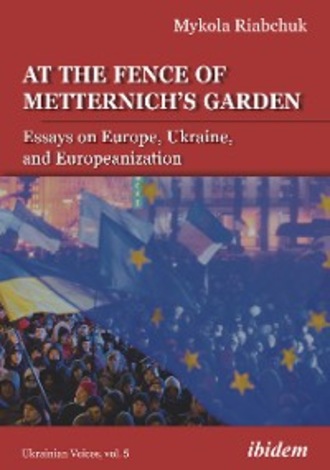
Полная версия
At the Fence of Metternich's Garden
Andrei Tsygankov, a U.S. professor from California, perfectly sums up the political essence of the exclusivist discourse of Western ‘Eurasianists’. He starts with an apocalyptic vision of post-Soviet space, a.k.a. ‘Eurasia’:
Violence is gradually spreading, waiting for an opportunity to erupt into a large-scale conflict. Transregional transportation routes may soon be choked due to Russia’s conflicts with Ukraine, Georgia, and Turkmenistan. The West’s attempts to secure and stabilize Eurasia after the end of the Cold War must be recognized as a failure … Eurasia has not become stable or peaceful and continues to disintegrate (RFE/RL Headlines, 29 October 2009).
The only way to preventing a “collapse in Eurasia”, he suggests candidly, is to recognize “Russia’s role in stabilizing the region”:
Once this is done in practice, and not rhetorically, many pieces of the region’s puzzle may start falling into place. Energy supplies may become more reliable; governments in politically contested areas—like Georgia, Ukraine, and Moldova—may obtain a greater legitimacy; and the so-called frozen conflicts may have a better opportunity to be resolved.
And if Russia is not allowed to deliver a “greater legitimacy” to the neighboring governments, they should blame nobody but themselves: Russia will probably “dedicate itself to obstructing Western policies in Eurasia”, and “we will see more of the collapsing dynamics in the region. Ukraine and Moldova may disintegrate, as did Georgia. Central Asia and Azerbaijan are likely to be subjected to a much greater degree of instability with unpredictable consequences”.
Here, in a delicate mixture of covert blackmail and mild self-fulfilling prophecy, a Western ‘Eurasianist’ comes very close to his Russian counterparts from today’s ‘neo-Eurasianist’ movement. Mr. Dugin would definitely agree that “instead of expanding its reach further, NATO ought to learn its limitations”, and that the only way “to restore the region’s capacity to function and perform basic services for its residents” is to “curb Russophobic nationalism”. Who will compile the list of “Russophobic nationalists” is not quite clear, but the record might be pretty long, provided that even Alyaksandr Lukashenko is failing to meet the requirements of genuine Russophilism.
The ultimate goal of both Russian and Western ‘Eurasianists’, however, is clear: “there is hardly an alternative to the emergence of an economically and culturally transparent community of nations with strong ties to the former metropole”. And therefore, as Tsygankov put it, “the overall objective of the outside world should be to strengthen Russia’s confidence as a regional great power.”
There is apparently no room for the New Eastern Europe within this project—and never has been.
2010
Конец ознакомительного фрагмента.
Текст предоставлен ООО «ЛитРес».
Прочитайте эту книгу целиком, купив полную легальную версию на ЛитРес.
Безопасно оплатить книгу можно банковской картой Visa, MasterCard, Maestro, со счета мобильного телефона, с платежного терминала, в салоне МТС или Связной, через PayPal, WebMoney, Яндекс.Деньги, QIWI Кошелек, бонусными картами или другим удобным Вам способом.



